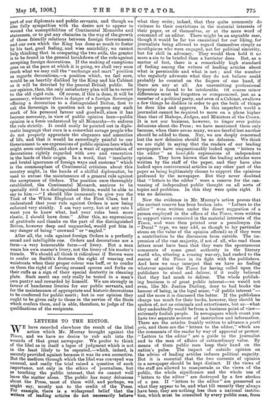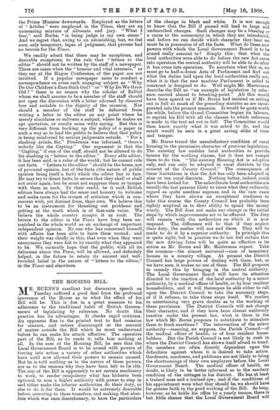LETTERS TO THE EDITOR.
WE have recorded elsewhere the result of the libel action which Mr. Murray brought against the Times, and we have no desire to rub salt into the wounds of that great newspaper. We prefer to think of the libel as in itself a lapse of judgment which is not in the least likely to be repeated,—which, indeed, is securely provided against because it was its own corrective. But the medium through which the libel was conveyed was unusual, and really the trial raised a question of such importance, not only in the ethics of journalism, but as touching the public interest, that we cannot well leave the matter alone. The public has many delusions about the Press, most of them wild, and perhaps, we might say, mostly not to the credit of the Press. For example, there is a widespread belief that the writers of leading articles do not necessarily believe WE have recorded elsewhere the result of the libel action which Mr. Murray brought against the Times, and we have no desire to rub salt into the wounds of that great newspaper. We prefer to think of the libel as in itself a lapse of judgment which is not in the least likely to be repeated,—which, indeed, is securely provided against because it was its own corrective. But the medium through which the libel was conveyed was unusual, and really the trial raised a question of such importance, not only in the ethics of journalism, but as touching the public interest, that we cannot well leave the matter alone. The public has many delusions about the Press, most of them wild, and perhaps, we might say, mostly not to the credit of the Press. For example, there is a widespread belief that the writers of leading articles do not necessarily believe what they write; indeed, that they quite commonly do violence to their convictions in the material interests of their paper, or of themselves, or at the mere word of command of an editor. There might be an arguable case, though it would be far too casuistical for our liking, for journalists being allowed to regard themselves simply as mouthpieces who were engaged, not for political sincerity, but for skill in advocacy. They would then hold it no more a sin to be briefed than a barrister does. But, as a matter of fact, there is a remarkably high standard of feeling among the writers of leading articles about what is permissible and what is not ; and the number who regularly advocate what they do not believe could probably he counted on the fingers of one hand, if there are any at all. An unremitting professional hypocrisy is found to be intolerable. Of course minor differences must be forgotten or compromised, just as a member of a political party, and even of a Cabinet, swallows a few things he dislikes in order to get the bulk of things he does like and approve. In this imperfect world a journalist cannot be required to move on a plane higher than that of Bishops, Judges, and Ministers of the Crown. It is not our business, however, to linger over public delusions about the Press ; we have mentioned them only because, when there are so many, we are fearful lest another should be added to them. Nay, we are deeply concerned lest the new delusion should be no delusion. We think we are right in saying that the readers of our leading newspapers have unquestionably looked upon " letters to the editor " as bond fideexpressions of independent opinion. They have known that the leading articles were written by the staff of the paper, and they have also looked upon controversial articles in any other part of the paper as being legitimately chosen to support the opinions professed by the newspaper. But they never doubted that " letters to the editor ' were a reserve for the can- vassing of independent public thought on all sorts of topics and problems. In this they were quite right. It was no delusion.
Now the evidence in Mr. Murray's action proves that the ancient reserve has been broken into. " Letters to the editor " were written under the direct suggestion of a person employed in the offices of the Times, were written to support views conceived in the material interests of the Times, and were then printed over a pseudonym (in " Ducal " type, we may add, as though to lay particular. stress on the value of the opinion offered) as if they were a contribution to the discussion from outside. The im- pression of the vast majority, if not of all, who read these letters must have been that they were the spontaneous comments of some great authority in the literary world who, uttering a rousing war-cry, had rushed to the rescue of the Times in its fight with the publishers. And here we may interject that we have no feeling' whatever against the Times for having called upon the publishers to stand and deliver, if it really believed that they had much to deliver. The .whole publish- ing business is of great public interest—we would not even, like Mr. Justice Darling, deny to bad books the honour of being, in the legal sense, "of public interest "— and the more it is discussed the better. If the publishers charge too much for their books, however, they should be spoken of, not as criminals and extortioners, but as—what • they undoubtedly would be from a business point of view— extremely foolish people. In newspapers which count you have two separate sources of instruction and information. There are the articles frankly written to advance a party p-is, and there are the " letters to the editor," which are the comments of the reader by way of approval or protest. ," Letters to the editor" are a guide to the journalist and to the man of affairs of extraordinary value. By means of them public men keep their hand on the nation's pulse. The impact of outside opinion on the advice of leading articles induces political sagacity. But it is essential that the two currents of opinion in a newspaper should be kept distinct. If the views of the staff are allowed to masquerade as the views of the public, the whole significance and the whole use of " letters to the editor " are destroyed by a few strokes of a pen. If "letters to the editor" are preserved as what they appear to be, and what till recently they always )iave been, they are nothing less than a national institu- tion, which must be consulted by every public man, from the Prime Minister downwards. Employed as the letters of " Artifex " were employed in the Times, they are an unmeaning mixture of advocate and jury. "What I fear," said Burke, "is being judge in my own cause." And we regret that, owing to an astonishing, but, we feel sure, only temporary, lapse of judgment, that process had no terrors for the Times.
We readily admit that there may be exceptions, and desirable exceptions, to the rule that " letters to the editor " should not be written by the staff of a newspaper. There are cases when the " honour and vital interests," as they say at the Hague Conference, of the paper are not involved. If a popular newspaper cares to conduct a correspondence on some such engaging subject as " Why Do Our Children's Ears Stick Out?" or " Why Do We Grow Old ? " there is no reason why the scholar of Balliol whom we shall assume to be a member of the staff should not open the discussion with a letter adorned by classical lore and suitable to the dignity of the occasion. Nor should a member of the staff be debarred from writing a letter to the editor on any point where he merely elucidates or enlivens a subject, where he makes an apt quotation, or recalls some witty saying. But this is very different from backing up the policy of a paper in such a way as to lead the public to believe that that policy is being reinforced by serious judgments outside. " For a slashing article, Sir," Pendennis was informed, " there's nobody like the Capting." Our argument is that the "Capting," if one of the staff, should not be allowed to do his slashing in "letters to the editor." Every able editor, it has been said, is a ruler of the world; but be cannot rule out facts. " Letters to the editor " should be the home, not of procured opinion, but of the facts (the nature of public opinion being itself a fact) which the editor has to face. He may try to direct facts, to secure that they shall or shall not occur again, but he must not suppress them or tamper with them as such. To their credit, be it said, British editors have always had the sense and honesty to welcome and make room for the stream of criticism which is con- current with, yet distinct from, their own. We believe this to be an instrument for thrashing out problems and getting at the truth which is of first-rate value. We believe the whole country accepts it as such. The letters to the editor in the Times have long been un- matched in the whole world as an exchange of important independent opinion. No one who has concerned himself, with affairs has been able to leave them unread ; and their weight was chiefly in this, that even when they were anonymous they were felt to be exactly what they appeared to be. We earnestly hope that the public, with all its delusions about the Press, will be allowed, and definitely helped, in the future to retain its ancient and well- founded belief in the nature of " letters to the editor," in the Times and elsewhere.















































 Previous page
Previous page